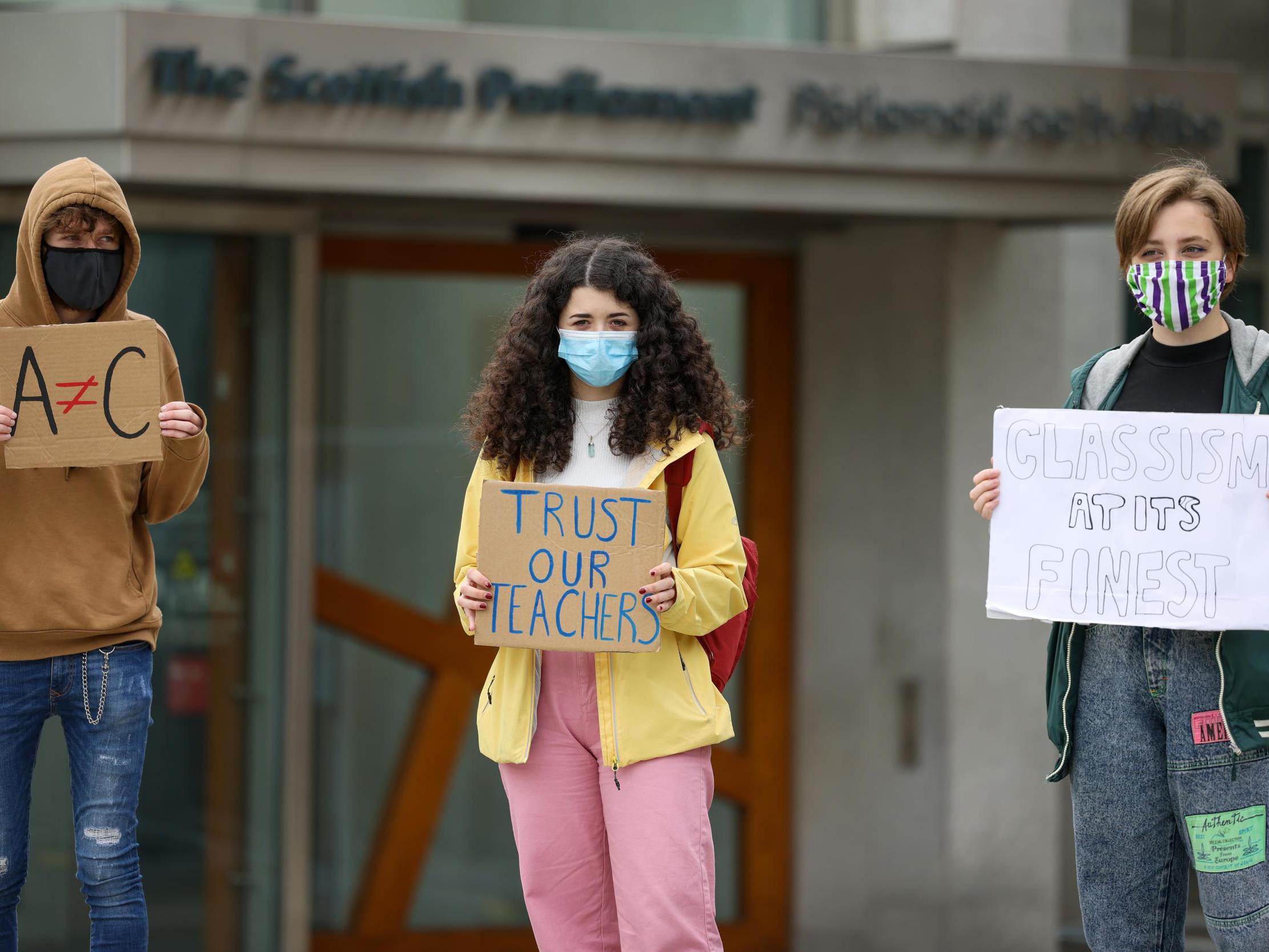Students prepared to protest in England as ‘hectic’ results system changed at last minute
‘You have to be proactive when it is your future at stake,’ one pupil says
Your support helps us to tell the story
From reproductive rights to climate change to Big Tech, The Independent is on the ground when the story is developing. Whether it's investigating the financials of Elon Musk's pro-Trump PAC or producing our latest documentary, 'The A Word', which shines a light on the American women fighting for reproductive rights, we know how important it is to parse out the facts from the messaging.
At such a critical moment in US history, we need reporters on the ground. Your donation allows us to keep sending journalists to speak to both sides of the story.
The Independent is trusted by Americans across the entire political spectrum. And unlike many other quality news outlets, we choose not to lock Americans out of our reporting and analysis with paywalls. We believe quality journalism should be available to everyone, paid for by those who can afford it.
Your support makes all the difference.Pupils have said they are prepared to take to the streets in protest at this year’s A-level results as ministers come under fire for a system critics warn “beggars belief”.
The National Union of Students (NUS) backed the use of demonstrations, saying schoolchildren had been left with no choice.
Ministers are facing increasing pressure after Ofqual, the exams watchdog, said it could not clarify an eleventh hour change to allow mock grades to be considered in some cases until days after the results are released.
The U-turn by ministers had been designed to head off anger when pupils receive their grades on Thursday.
On Wednesday night education secretary Gavin Williamson also resisted calls for a full U-turn, insisting the system was fair.
Following the cancellation of this year’s exams because of the coronavirus crisis, teachers were told to submit predicted grades for each student.
Controversially, however, exam boards have “moderated” many grades to ensure that this year’s results are not significantly higher than in previous years.
It means students will now potentially choose between the marks they are awarded, their mock results, or – if they are not happy with either of those – they can resit the exam in the autumn.
But Geoff Barton, general secretary of the Association of School and College Leaders, warned the so-called triple lock contained “massive inconsistencies”.
“The idea of introducing at the eleventh hour a system in which mock exam results trump calculated grades beggars belief,” he said.
Experts warned schools use mocks in different ways, some as a confidence boost for students and others as a way to encourage pupils to study.
Labour leader Sir Keir Starmer described the last minute U-turn as a “complete fiasco”.

In Scotland nearly 125,000 grades were lowered as a result of “moderation”.
But the system was scrapped after Scottish pupils demonstrated.
Ellie Kerr, from Exeter, who hopes to study medicine at the University of Edinburgh, told The Independent: “I think if it doesn’t go well for myself or my friends, I would protest in support of them because I think it is a really unfair system.
“It’s also an unfair system by a government I didn’t even vote for. I was four months too young to vote.”
Jake Patrick, an A-level student from Stourbridge, says he would be tempted to protest if he thought his grades were “completely not what I would have got”.
The 18-year-old has an offer to study economics and finance at university.
Another student, hoping to study medicine at the University of Birmingham, said they would also likely protest.
“You have to be proactive and take matters into your own hands when it is your future at stake,” the 18-year-old said.
In Scotland angry pupils and parents took to the streets protesting that the downgrading process had unfairly affected pupils from deprived backgrounds, or those who attended low-performing schools, simply because of geography.
The pass rate for Higher pupils living in the most deprived areas was reduced by 15.2 per cent, compared to 6.9 per cent in the most affluent parts of the country.
The downgraded results have now been returned to the original teacher estimates.
The NUS president, Larissa Kennedy, said: “Given the role played by student protesters in changing the policy in Scotland, we are unsurprised students in England are looking to make their voice heard.

“The UK government has refused to listen to students’ calls for a U-turn on the classist, racist moderation system and young people are left with no choice but to take to the streets.”
She added the union supported student efforts to make sure the government heard “concerns about the unfairness of the moderation system”.
The acting Liberal Democrat leader Ed Davey said: “It is no wonder young people are prepared to protest when their futures are being so badly handled by a government that has clearly failed the test.
“Relying on mock examinations will not be fair to many pupils who also look to be falling victim to the government’s botched grading system."
In England, students will have to go through the appeals process to use their mock exam result, with their school required to submit evidence to the exam board.
The Department for Education has been approached for comment.
Additional reporting by Press Association
Join our commenting forum
Join thought-provoking conversations, follow other Independent readers and see their replies
0Comments